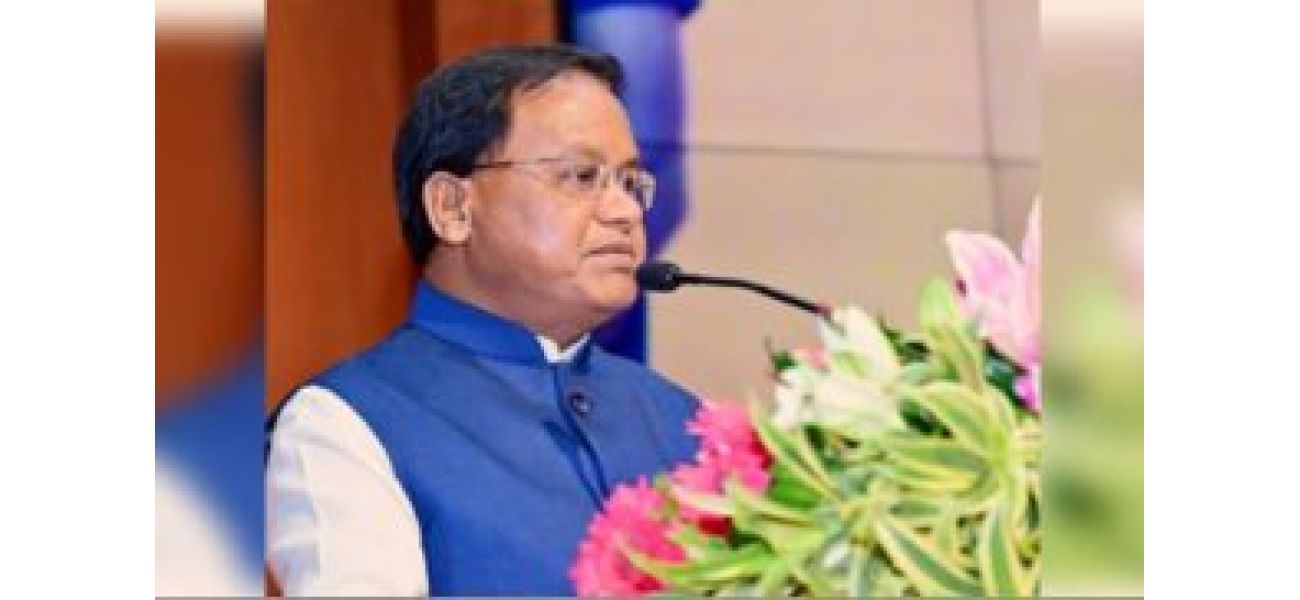The success of Odisha is based on pride, determination, and effort according to the CM.
Chief Minister Mohan Charan Majhi vows to use the pillars of "Odia Asmita," high ambition and tireless efforts to build a prosperous Odisha.
April 1st 2025.

On Tuesday, Chief Minister Mohan Charan Majhi made a promise to the people of Odisha to create a prosperous state. He declared that the three pillars of his government would be "Odia Asmita," high ambition, and tireless efforts. These pillars would serve as the foundation for the state's progress.
The occasion for Majhi's speech was the state-level celebration of "Odisha Dibasa," which takes place on April 1st every year. This date holds great significance as it marks the birth of Utkal Gourav Madhusudan Das, one of the key figures in the formation of a separate Odisha state in 1936. The day is observed to remember the struggles faced by the people of Odisha and to preserve its unique language, culture, and traditions.
In a historic move, the ruling BJP, which campaigned on the platform of "Odia Asmita," chose to hold the Odisha Dibasa celebration in Satyabhamapur village in the Cuttack district. This village holds a special place in the hearts of Odias as it is the birthplace of Utkal Gourav. The Chief Minister referred to this village as a "sacred pilgrimage site" and announced plans to transform it into a hub of Odia nationalism.
During his speech, Majhi laid the foundation stone for the "Integrated Development of Madhusudan Das's Birthplace" project, which will be developed with an investment of Rs 21 crore. The project includes an interpretation center, a renovated ancestral home, a statue, a guest house, a library, and a light-and-sound system near a nearby water body.
Majhi acknowledged that the debt owed to the great sons of Odisha and their sacrifices could never be repaid. However, he promised to fulfill their dreams of building a prosperous Odisha. He reiterated that "Odia Asmita," high ambitions, and tireless efforts would be the driving forces in achieving this goal.
The day saw greetings pouring in from various dignitaries such as President Droupadi Murmu, Prime Minister Narendra Modi, Vice President Jagdeep Dhankar, Governor Haribabu Kambhampati, Leader of Opposition Naveen Patnaik, and others. Murmu, who hails from Odisha, expressed her pride in the state's rich cultural heritage and the contributions made by its people in various fields. She also offered her prayers for the peace and prosperity of Odisha.
In his message, Prime Minister Modi also extended his warm wishes on Utkala Dibasa and praised the state for its rich culture, literature, and music. He highlighted the hardworking nature of the people of Odisha and the efforts made by the central and state governments in promoting its progress.
Majhi called upon the 4.5 crore people of Odisha to come together in this transformative journey and stated that no force could stop their collective resolve. He also outlined ambitious economic goals of a 500 billion USD economy by 2036 and a 1.5 trillion USD economy by 2047, positioning the state as a growth engine for a developed India.
As part of the celebrations, Majhi also launched the "Odia Pakshya" program, which will run from April 1st to 14th. He urged the people to embrace traditional Odia food, dress, language, and literature, stating that the true identity of Odias flows in their blood. He also paid tribute to luminaries such as Gopabandhu Dash, Parala king Krushnachandra Gajapati, Mayurbhanj Maharaja Ramachandra Bhanjkadeo, Pandit Godabaris Mishra, Gangadhar Meher, Fakir Mohan Senapati, and others who fought for Odisha's linguistic and cultural awakening.
Majhi ended his speech with a powerful quote from Madhubabu - "Utha re Utha Utkala Santana, Uthibu tu kete dine, Puruba Gaurava Puruba Sahasa, Padiba ki kebe mane!" (Wake up, O sons of Utkala, how long will you sleep? Will you ever achieve the greatness and courage of your forefathers?)
He also highlighted the fact that the Odia language has now been recognized as a classical language, but there was a time when it was not even accepted as a separate language. The political situation during the British era had kept Odisha in a miserable position, with some parts of the Odia-speaking region being included in other presidencies, leading to the spread of other languages and cultures. However, Majhi expressed his determination to preserve and promote the unique identity of Odisha.
The occasion for Majhi's speech was the state-level celebration of "Odisha Dibasa," which takes place on April 1st every year. This date holds great significance as it marks the birth of Utkal Gourav Madhusudan Das, one of the key figures in the formation of a separate Odisha state in 1936. The day is observed to remember the struggles faced by the people of Odisha and to preserve its unique language, culture, and traditions.
In a historic move, the ruling BJP, which campaigned on the platform of "Odia Asmita," chose to hold the Odisha Dibasa celebration in Satyabhamapur village in the Cuttack district. This village holds a special place in the hearts of Odias as it is the birthplace of Utkal Gourav. The Chief Minister referred to this village as a "sacred pilgrimage site" and announced plans to transform it into a hub of Odia nationalism.
During his speech, Majhi laid the foundation stone for the "Integrated Development of Madhusudan Das's Birthplace" project, which will be developed with an investment of Rs 21 crore. The project includes an interpretation center, a renovated ancestral home, a statue, a guest house, a library, and a light-and-sound system near a nearby water body.
Majhi acknowledged that the debt owed to the great sons of Odisha and their sacrifices could never be repaid. However, he promised to fulfill their dreams of building a prosperous Odisha. He reiterated that "Odia Asmita," high ambitions, and tireless efforts would be the driving forces in achieving this goal.
The day saw greetings pouring in from various dignitaries such as President Droupadi Murmu, Prime Minister Narendra Modi, Vice President Jagdeep Dhankar, Governor Haribabu Kambhampati, Leader of Opposition Naveen Patnaik, and others. Murmu, who hails from Odisha, expressed her pride in the state's rich cultural heritage and the contributions made by its people in various fields. She also offered her prayers for the peace and prosperity of Odisha.
In his message, Prime Minister Modi also extended his warm wishes on Utkala Dibasa and praised the state for its rich culture, literature, and music. He highlighted the hardworking nature of the people of Odisha and the efforts made by the central and state governments in promoting its progress.
Majhi called upon the 4.5 crore people of Odisha to come together in this transformative journey and stated that no force could stop their collective resolve. He also outlined ambitious economic goals of a 500 billion USD economy by 2036 and a 1.5 trillion USD economy by 2047, positioning the state as a growth engine for a developed India.
As part of the celebrations, Majhi also launched the "Odia Pakshya" program, which will run from April 1st to 14th. He urged the people to embrace traditional Odia food, dress, language, and literature, stating that the true identity of Odias flows in their blood. He also paid tribute to luminaries such as Gopabandhu Dash, Parala king Krushnachandra Gajapati, Mayurbhanj Maharaja Ramachandra Bhanjkadeo, Pandit Godabaris Mishra, Gangadhar Meher, Fakir Mohan Senapati, and others who fought for Odisha's linguistic and cultural awakening.
Majhi ended his speech with a powerful quote from Madhubabu - "Utha re Utha Utkala Santana, Uthibu tu kete dine, Puruba Gaurava Puruba Sahasa, Padiba ki kebe mane!" (Wake up, O sons of Utkala, how long will you sleep? Will you ever achieve the greatness and courage of your forefathers?)
He also highlighted the fact that the Odia language has now been recognized as a classical language, but there was a time when it was not even accepted as a separate language. The political situation during the British era had kept Odisha in a miserable position, with some parts of the Odia-speaking region being included in other presidencies, leading to the spread of other languages and cultures. However, Majhi expressed his determination to preserve and promote the unique identity of Odisha.
[This article has been trending online recently and has been generated with AI. Your feed is customized.]
[Generative AI is experimental.]
0
0
Submit Comment





